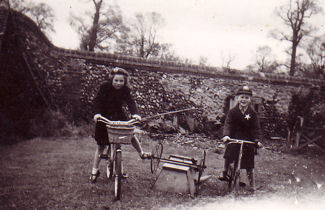This is the third part of a series of childhood memories of Trumpington in the 1940s and 1950s. For an introduction to the series, see Childhood Memories of Trumpington .
Over the next few years I was to endure several visits here. Just turning the final corner and seeing that street name-plate was enough to start the butterflies churning in your stomach.
We sat in the dingy waiting room with a selection of kids from other schools. Some had had their injections and were waiting for the numbness to take hold. Others had bloodstained cigarettes of cotton wool protruding from their mouths, waiting for the post-extraction bleeding to abate before they were sent back to their respective schools. It was very much a production line – trying to treat as many children as possible in a working day, and there was precious little time allowed for any comforting. There was a noticeable absence of any parents; molly- coddling children was not encouraged in those days. Self-reliance was the new watchword, and any strong emotional bond with your child, especially boys, was to be avoided. How else were we to grow up with the traditional British stiff upper lip? All the while, behind various closed doors, we could hear the whirring of numerous dental drills. You know when your dentist now changes drill handsets from high speed to low speed, and says, “This will be a little bumpy”? Well all the dental drills were like that then. It wasn’t so much drilling as grinding. And then there were the muted sounds of children whimpering, as dental forceps took up their crunching and unforgiving grip; whilst the hapless child’s head would be held back in the firm grip of a white coated dental nurse. As you sat in the waiting room, your trembling clammy hands holding one of the ancient dog-eared and well-thumbed comics that had been thoughtfully provided a few years prior, you knew that before too long you’d probably be whimpering too. Because of the logistics involved they liked to do all the necessary treatment in just the one visit. So you could have several fillings, and an extraction or two, all on the one sitting. Your jaw would eventually ache from keeping your mouth wide open for so long.
Apparently the idea was that after our respective treatments, our group of three should re- group in the waiting room to make the return journey together. But something went amiss on my first dental expedition. Perhaps I hadn’t understood the bit about coming back together. Or perhaps they hadn’t. Maybe they got fed up of waiting whilst I was having more than my fair share of dental work and went back to school without me. But either way, as a lone seven year old, probably suffering from clinical shock, and no doubt drooling blood-stained saliva from a totally numb face, I found myself wandering unknown streets of Cambridge trying to find the bus station. When only two pupils returned to school there was some consternation. But Iâ €™d been on the bus to Cambridge and back with my mother on numerous occasions, and knew which bus services went to our village. So, I just caught the next available bus; and finding the school now closed for the day I turned around and walked home. I couldn’t quite understand the fuss that my mother made, nor that of the staff at school the next day. I’d felt perfectly safe and in control, once I’d got out of that blasted dental surgery!
Continue with the next part of Brian Goodliffe’s childhood memories of Trumpington in the 1940s and 1950s.
Brian Goodliffe and Elizabeth Youngs in the back garden of Dated Cottages, 18 Grantchester Road, 1950, wearing blue gabardine raincoats and caps with Fawcett School badges. Brian has been promoted from police constable to sheriff, with a star on his coat. Photo: Goodliffe family.
